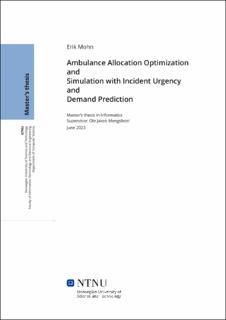| dc.contributor.advisor | Mengshoel, Ole Jakob | |
| dc.contributor.author | Mohn, Erik | |
| dc.date.accessioned | 2023-09-27T17:21:27Z | |
| dc.date.available | 2023-09-27T17:21:27Z | |
| dc.date.issued | 2023 | |
| dc.identifier | no.ntnu:inspera:145904930:34745474 | |
| dc.identifier.uri | https://hdl.handle.net/11250/3092541 | |
| dc.description.abstract | Mange hendelser som krever assistanse fra medisinsk personell er tidskritiske. Det er derfor nødvendig at utrykningskjøretøy når frem til hendelsesstedet så raskt som mulig for å gi pasienten den behandlingen de trenger. De siste årene har den gjennomsnittlige responstiden ved akutte hendelser i Oslo økt, noe som kan ha store konsekvenser. Med begrensede ressurser har Akuttmedisinsk kommunikasjonssentral i Oslo og Akershus en viktig utfordring med det å redusere ambulansens responstid.
Denne masteroppgaven vil forsøke å bistå i denne utfordringen, ved å undersøke og utvikle verktøy som kan forbedre utnyttelsen av eksisterende ressurser. Optimaliseringen gjøres ved å strategisk allokere ambulanser til spesifikke ambulansebasestasjoner slik at de har større sannsynlighet for å være i nærheten av kommende hendelser. Simuleringer ved hjelp av et sett med historiske hendelser i Oslo og Akershus kan evaluere ulike allokeringer gjennom den resulterende gjennomsnittlige responstiden fra simuleringen, som brukes til å heuristisk finne gode allokeringer ved hjelp av metoder innenfor kunstig intelligens. Spesielt brukes en evolusjonær tilnærming som utnytter den genetiske algoritmens evne til å søke i det store antallet mulige allokeringer.
Hovedbidraget til denne oppgaven er tilpasningen av optimaliseringsmetoden til å håndtere alvorsgraden av hendelser. Riktig klassifisering av akutte hendelser er viktig, da responstiden er kritisk, og ressurser bør prioriteres til disse hendelsene fremfor mindre kritiske hendelser. Videre inkluderer bidragene forbedring av både den evolusjonære optimaliseringsalgoritmen og simuleringens nøyaktighet. | |
| dc.description.abstract | Rapid medical assistance can mean the difference between life and death in many cases. For this reason, it is essential that emergency response vehicles reach the scene of an incident as quickly as possible to provide patients with timely treatment. Unfortunately, recent years have seen a rise in the average response time to incidents in Oslo, which could have severe consequences. As the Emergency Medical Communication Centre in Oslo and Akershus faces limited resources, reducing ambulance response time has become a crucial challenge.
This thesis aims to address this challenge by researching and developing tools to improve the management and utilization of existing resources. The optimization involves strategically allocating ambulances to specific ambulance base stations so that they are more likely to be close to upcoming incidents. Simulations using real-world historic incidents in the area of Oslo and Akershus can evaluate different allocations through the resulting response times. The simulations are used to heuristically find good allocations using artificial intelligence methods, specifically, an evolutionary approach that takes advantage of the genetic algorithm’s ability to search in a great number of possible allocations.
The primary contribution of this thesis is the adaptation of the optimization method to consider the different urgencies of incidents. Correctly classifying the acute incidents is important since their response time is critical and resources should prioritize those incidents over less critical ones. Additionally, contributions include the improvement of both the evolutionary optimization algorithm and the accuracy of the simulation. By addressing the important challenge of reducing ambulance response time, this research has the potential to enhance emergency medical services and improve patient outcomes. | |
| dc.language | eng | |
| dc.publisher | NTNU | |
| dc.title | Ambulance Allocation Optimization and Simulation with Incident Urgency and Demand Prediction | |
| dc.type | Master thesis | |
